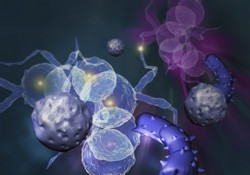Targeting the tumour microenvironment
The number of cancer patients in Europe is increasing, emphasising the need for novel therapeutic interventions. It is now widely accepted that tumour stroma and cancer-associated fibroblasts (CAFs) could be targeted, given their role in tumour growth, invasion, and metastasis. The EU-funded CAFFEIN(opens in new window) (Cancer associated fibroblasts (CAF) function in tumor expansion and invasion) project investigated the biology of CAFs and their role in various types of cancer including glioblastoma, skin and breast cancer. Considerable effort went also towards providing training for fellows to give them the necessary scientific and complementary skills to work in the pharmaceutical industry. Researchers analysed the role of CAF-derived exosomes in cancer progression and described a role for exosome-encapsulated miRNA in the differentiation of CAFs. Particular emphasis was laid on integrins, laminin-binding proteins and collagen XV in CAF differentiation and function, while a novel role was discovered for the small GTPase RhoA in CAF-dependent cancer cell invasion. The analysis of the CAF secretome led to the development of a high-throughput assay to study the interaction between cancer cells and CAFs. Furthermore, the CAFFEIN study investigated the development of cancer-related fibrosis and its contribution to disease progression. This led to the identification of novel drug targets that could prevent fibrosis and inhibit the cancer-promoting effects of CAFs. A number of antibody mimetics capable of targeting CAFs were discovered and screened for their capacity to prevent CAF formation. Taken together, the findings of the CAFFEIN project provided fundamental insight into the role of the tumour microenvironment and underscored the implication of CAFs in disease progression. The results will form the basis for the design of new anti-cancer therapies that could improve the expectancy and quality of life of cancer patients.







